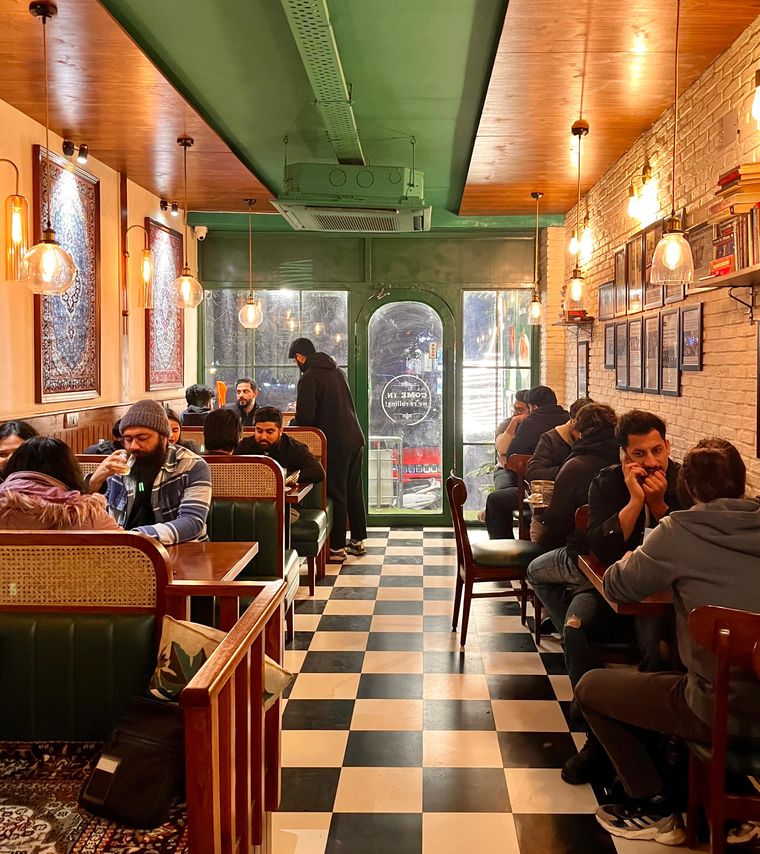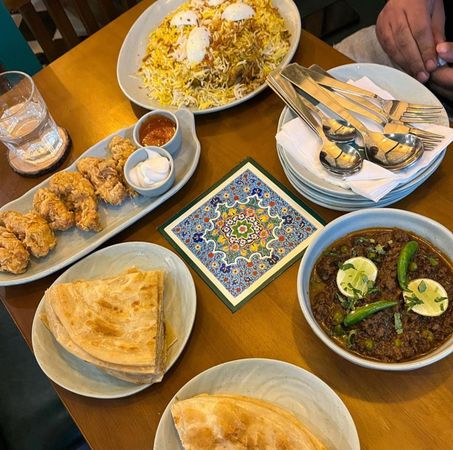The world wide web is often tangled in Kashmir. But Javid Parsa wove success regardless. The 36-year-old has created the largest restaurant chain in the valley―with 38 franchisees―by quitting his corporate job and leveraging his popularity online.
It started when he was studying in Hyderabad. Javid took a liking to Lamakaan, a cultural centre there that hosts plays, seminars and other social gatherings, while also catering to the taste buds of patrons. He would often go there as a student activist and help with the setup when there were Kashmir-related events.

Javid wanted such a space in his home state, where there would be food for belly, and thought. And so, in 2017, he started Parsa’s in the heart of Srinagar, about 60km from his home in Bandipora. It was launched as a place where artists, writers and poets come together, show their work, hold discussions and grab a bite.
The idea came from home. Born in a family steeped in Urdu literature, and with a poet great-grandfather, Javid pursued an MBA in Urdu at Maulana Azad University in Hyderabad. “After my graduation, I applied for a job at Amazon,” he said. “During the interview, my choice of Urdu was questioned, but my extensive networking experience as the founding general secretary of the university students’ union impressed them.”

Using his savings from a two-year stint at Amazon, he put in Rs7 lakh to create Parsa’s. “The name Parsa, my great-grandfather’s pen name, felt perfect,” he said. The modest 200sqft eatery, on the top floor of a mall at Jehangir Chowk, is airy and offers a great view. Great to sit with a book and a drink. In fact, they have their own library of more than 2,000 donated books, arranged in wooden shelves opposite the entrance. “Once you donate a book, you gain access to all books, one at a time for 15 days,” said Javid.
Authors Shahnaz Bashir and Ayaz Rasool have launched their books at Parsa’s and, recently, the launch of Those Who Stayed: The Sikhs of Kashmir by Bupinder Singh Bali drew quite the crowd.
As for the food, the menu at Parsa’s features mostly non-Kashmiri items such as dum biryani, kathi rolls, kebabs, tikkas and shakes. “In Kashmir, mutton-based recipes, especially wazwan, is a staple,” said Javid. “We wanted to treat our customers to delicacies that people enjoy outside.” For its outlets outside the valley, though, the menu includes wazwan.
Speaking of outlets, Parsa’s was not Javid’s first step in the food business. In 2014, he got the Jammu and Kashmir franchisee for Kathi Junction. There, he learnt the tricks of the trade that would help him start his own chain.
He sought more creative control and wanted to build a team of passionate youngsters. The journey was tough, not least because of the place he was in. Kashmir was devastated by floods when he was starting the Kathi Junction franchisee. In 2016, when he wanted to launch Parsa’s, the valley had come to a standstill after the killing of militant Burhan Wani. He got it off the ground the following year and began talks to set up the first franchisee, in Ladakh, days into launching the Srinagar one. “A customer approached me, expressing a desire to open a similar joint in Kargil, with a similar ambience and aura,” Javid recalled. “This sparked the expansion across Kashmir and beyond.”
Each Parsa’s outlet has a similar interior theme―the walls are white and yellow with green borders, and there is a lot of Kashmiri influence in terms of patterns and designs on the walls. Javid had studied interior design, and growing up had spent a lot of time in his carpenter father’s workshop.
On the food side, the different outlets share their recipes and arrange chefs, sometimes bringing a few from outside Kashmir. It is this collaboration that has helped the chain tide over tough times, including the Covid pandemic and the lockdown following the abrogation of Article 370. During these times, Javid paid his staff’s salaries from his savings. Taking on the role of a provider, he brought his younger siblings into the business.
The community that Javid created has only grown. There are now outlets in parts of Jammu, Delhi and Bengaluru, and franchisees like the one in Pampore, in Kashmir, have opened multiple branches. On its first anniversary in July 2022, the Pampore Parsa’s featured rabab maestro Noor Mohammad, who captivated the audience with his performance.
This was just one of the many cultural events that Parsa’s hosts. Others include hajj and umrah training and music sessions. On Sundays, young therapist Faiqa Zargar holds art therapy sessions at the Srinagar outlet. “After struggling for two years to find space to start a mental health support group, I posted a message on Instagram,” she said. “Javid bhai messaged, suggesting Parsa’s as a venue.” In a small hall at Parsa’s, she helps participants express their inner feelings using art.
Building and expanding his community is important to Javid, and the success of Parsa’s has drawn a lot of youngsters to his cause. Take, for instance, Iqbal Ahmed Mir. After completing his master’s in biotechnology, he started a dairy farm in Baramulla. But, it did not succeed. In 2021, he took on a Parsa’s franchisee and his luck turned. “Alhamdulillah (thank God), we are doing very well,’’ he said. “We have 70 tables and most remain occupied throughout the day.” He said they adhere to Parsa’s protocols to maintain quality and provide free accommodation to their staff whose homes are far away.
Another young man, Furqan Yousuf, along with his friend Khalid, a management graduate, started a franchisee this June at Shalteng on the busy Srinagar-Muzaffarabad highway. “We are doing well,” said Yousuf. “Being on the highway ensures a steady stream of customers, and Parsa’s is a well-known brand in Kashmir.”
Parsa’s was also among the first restaurants in the region to employ women, one of whom is now a manager at a leading airline. In May, Asmat and Sabreena, two teenage girls from a remote village near the Line of Control, joined Parsa’s to support their education. “There were no vacancies, yet they appointed us,” said Asmat, who works as a waitress; Sabreena works in the kitchen. Despite societal challenges, they feel safe and valued at Parsa’s. “Some of our customers tried to discourage our female staff from working,” said Javid. “But we stood by them. My own sister is part of the staff.”
Parsa’s organic growth has been fuelled by word of mouth and social media engagement. With 45,000 followers, Javid is one of the most popular Instagram personalities in Kashmir, and also a sought-after motivational speaker on the college circuit. His message, as is Parsa’s―food for all.
In a region often defined by adversity, the Parsa’s story is one of hope. And a reminder that food can not only fill stomachs, but also forge lasting bonds.



